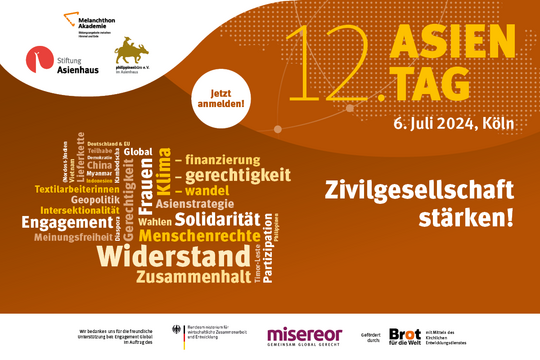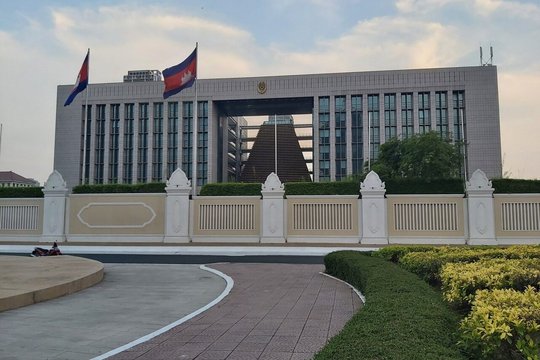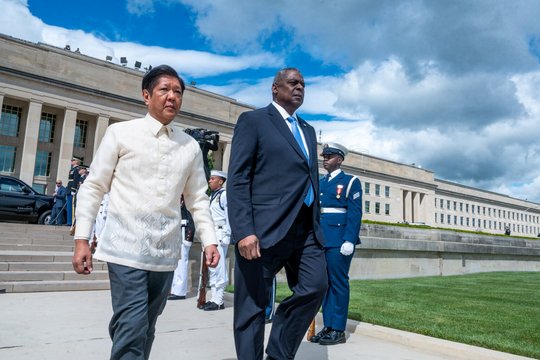Der Workshop "Mikrokredite: Chance oder Schuldenfalle?" gab eine Einführung zu Mikrokrediten und problematischen Entwicklungen im System. Am Fallbeispiel Kambodscha wurden dort gängige Praxen der Mikrokreditvergabe hinterfragt und beleuchtet.
Wie im Workshop versprochen, führen wir nun weiterführende Literatur, die im Workshop erwähnten Studien und die Hintergrundberichte auf die Bezug genommen wurde, auf.
Mikrokredite: Grundlagen und Einführung
UN-Bericht über Risiken im Zusammenhang mit privater Verschuldung (u.a. bei Mikrofinanzorganisationen)
- Independent Expert on the effects of foreign debt and other related international financial obligations of States on the full enjoyment of human rights (2020): Private debt and human rights: Report. UNHCR (A/HRC/43/45).
Woher kommt die Finanzierung der Mikrofinanzorganisationen?
Studien zu Mikrokreditzinsen
- Pronafim, IFC, Triple Jump, Sparkassenstiftung, FAS, BID, FOMIN (2017): Final Report. Study on Microcredit Interest Rates in Mexico.
- Gesellschaft für Internationale Zusammenarbeit (2015): Loan Pricing of Nigerian Microfinance Banks: Survey & Methods of Assessment.
- Die Pricing Data Platform von MFTransparency gibt Auskunft über die effektiven Zinsen zahlreicher Mikrofinanzorganisationen in 19 Ländern. Die Plattform wird seid 2015 nicht mehr aktualisiert, weil ihre Betreiber*innen keine Finanzierungsmöglichkeiten gefunden haben.
Studien zu den Wirkungen von Mikrofinanz:
- Duvendack, Maren; Palmer-Jones, Richard; Copestake, James; Hooper, Lee; Loke, Yoon; Rao, Nitya (2011): What is the evidence of the impact of microfinance on the well-being of poor people? London: EPPI-Centre, Social Science Research Unit, Institute of Education, University of London.
- Duvendack, Maren; Mader, Philip (2020): Impact of Financial Inclusion in Low- and Middle-Income Countries: A Systematic Review of Reviews. In: Journal of Economic Surveys 34 (3), S. 594–629.
- Augsburg, Britta; Haas, Ralph de; Harmgart, Heike; Meghir, Costas (2015): The Impacts of Microcredit: Evidence from Bosnia and Herzegovina. In: American Economic Journal: Applied Economics 7 (1), S. 183–203.
- Banerjee, Abhijit; Duflo, Esther; Glennerster, Rachel; Kinnan, Cynthia (2015): The Miracle of Microfinance? Evidence from a Randomized Evaluation. In: American Economic Journal: Applied Economics 7 (1), S. 22–53.
- Kritische Hinterfragung der RCTs: Bédécarrats, Florent; Guérin, Isabelle; Roubaud, Francois (2019): Microcredit RCTs in Development: Miracle or Mirage? Institut de Recherche pour le Développement. Paris (Document de Travail, DT/2019-13).
- Saving Groups als Alternative :Karlan, Dean; Savonitto, Beniamino; Thuysbaert, Bram; Udry, Christopher (2017): Impact of Savings Groups on the Lives of the Poor. In: Proceedings of the National Academy of Sciences of the United States of America 114 (12), S. 3079–3084.
- Banerjee, Subhabrata Bobby; Jackson, Laurel (2017): Microfinance and the Business of Poverty Reduction. Critical Perspectives from Rural Bangladesh. In: Human Relations 70 (1), S. 63–91.
- Davis, Peter (2007): Discussions Among the Poor. Exploring Poverty Dynamics with Focus Groups in Bangladesh. Manchester: Chronic Poverty Research Centre (CPRC working paper, 84).
- Hinrichsen, Megan B. (2018): Living within the Narrative of Microfinance: Vulnerability, Well-intentioned Debt, and the Individualization of Social Problems in Quito, Ecuador. In: Research in Economic Anthropology 38, S. 31–54.
- Loubere, Nicholas (2018): Indebted to development: microcredit as (de)marginalisation in rural China. In: The Journal of Peasant Studies 45 (3), S. 585–609.
- Mackenzie, Catherine; Louth, Jonathon (2020): The Neoliberal Production of Deserving and Undeserving Poor: A Critique of the Australian Experience of Microfinance. In: Social Policy and Society 19 (1), S. 19–35.
- Monirul, Hassan S. M.; Islam Md Maidul (2019): The Socio-Economic Impact of Microfinance on the Poor Family: A Study from Bangladesh. In: Journal of Asian and African Studies 54 (1), S. 3.
Studien zu Mikrofinanzkrisen, Verschuldung, Überschuldung
- Rees, Malcolm (2020): South Africa’s unsecured lending industry: A threat to basic human rights. In: BizNews, 18.02.2020.
- Guérin, Isabelle; Morvant-Roux, Solène; Villarreal, Magdalena (2014): Microfinance, debt and over-indebtedness. Juggling with money. London: Routledge
- Guérin, Isabelle; Labie, Marc; Servet, Jean-Michel (Hg.) (2015): The crises of microcredit. London: Zed Books.
- Schicks, Jessica (2014): Over-Indebtedness in Microfinance – An Empirical Analysis of Related Factors on the Borrower Level. In: WORLD DEVELOPMENT 54, S. 301–324.
Literatur zur Idee, Akteur*innen, Businessmodell:
- Insbesondere: Roodman, David Malin (2012): Due Diligence. An Impertinent Inquiry Into Microfinance. Washington, D.C: Center For Global Development.
- Mader, Philip (2015): The political economy of microfinance. Financializing poverty. Houndmills, Basingstoke Hampshire, New York, NY: Palgrave Macmillan.
- Klas, Gerhard; Mader, Philip (2014): Rendite machen und Gutes tun? Mikrokredite und die Folgen neoliberaler Entwicklungspolitik. Frankfurt am Main: Campus-Verlag (hier hat auch Sophia Cramer einen Artikel veröffentlicht).
- Bericht eines ehemaligen Mitarbeiters eines Investors (Triple Jump): Sinclair, Hugh (2012): Confessions of a microfinance heretic. How microlending lost its way and betrayed the poor. 1. ed. San Francisco, Calif.: Berrett-Koehler.
Studien über die Praktiken von Mikrofinanzorganisationen gegenüber ihren Kund*innen
- Ali, H. M. Ashraf (2014): Blaming the Poor and Legitimizing Coercive Loan Recovery Strategies: Unveiling the Dark Side of NGO Practices in Bangladesh;. In: Anthropologica 56 (1), S. 177–191.
- Augsburg, Britta; Fouillet, Cyril (2010): Profit Empowerment: The Microfinance Institution´s Mission Drift. In: Perspectives on Global Development and Technology 9 (3-4), S. 327–355.
- Hussain, A. H. M. Belayeth (2019): Disciplining Microfinance Borrowers in Bangladesh. In: Social Change 49, S. 453–468.
- Karim, Lamia (2008): Demystifying Micro-Credit. In: Cultural Dynamics 20 (1), S. 5–29.
- Maîtrot, Mathilde (2019): Understanding Social Performance: A ‘Practice Drift’ at the Frontline of Microfinance Institutions in Bangladesh. In: Development and Change 50 (3), S. 623–654.
- Vik, Elisabeth (2010): In Numbers We Trust: Measuring Impact or Institutional Performance? In: Perspectives on Global Development and Technology 9 (3-4), S. 292–326.
Studien mit Fokus auf Genderaspekte
- Rabiul Karim, K. M.; Kong Law, Chi (2013): Gender Ideology, Microcredit Participation and Women's Status in Rural Bangladesh. In: International Journal of Sociology and Social Policy 33 (1/2), S. 45–62.
- Sengupta, Nilanjana (2013): Poor Women's Empowerment: The Discursive Space of Microfinance. In: Indian Journal of Gender Studies 20 (2), S. 279–304.
- Haase, Dwight (2012): Revolution, Interrupted: Gender and Microfinance in Nicaragua. In: Critical Sociology 38 (2), S. 221–240.
- Geleta, Esayas Bekele (2015): The Microfinance Mirage. The Politics of Poverty, Social Capital and Women's Empowerment in Ethiopia. Farnham, Surrey, UK, Burlington, VT: Ashgate.
- Karim, Lamia (2011): Microfinance and its Discontents. Women in Debt in Bangladesh. Minneapolis: University of Minnesota Press.
Wir danken Sophia Cramer für die Bereitstellung der umfangreichen Hintergrundliteratur und Links.
Informationen zu Mikrokrediten in Kambodscha
FIAN-Informationen zu Kambodscha
FIAN Deutschland hat mehrere Artikel auf ihrer Fallarbeitsseite zu Kambodscha zum Thema Mikrokredite veröffentlicht.
Darunter auch mehrere Pressemitteilungen, wie z. B.: Corona-Krise in Kambodscha: Überschuldung durch Mikrokredite führt zu Landlosigkeit und Hunger
Das im Workshop gezeigte Video:
<iframe width="560" height="315" src="https://www.youtube-nocookie.com/embed/D-ttfWUyJ70" frameborder="0" allow="accelerometer; autoplay; clipboard-write; encrypted-media; gyroscope; picture-in-picture" allowfullscreen=""></iframe>
Studien zu Kambodscha
Hintergrundpapiere (in Englisch):
- Worked to Debt: Over-Indebtedness in Cambodia's Garment Sector (Juni 2020)
von Cambodian Alliance of Trade Unions (CATU), the Center for Alliance of Labor and Human Rights (CENTRAL) and the Cambodian League for the Promotion and Defense of Human Rights (LICADHO) - Driven Out: One Village's Experience with MFIs and Cross-Border Migration (Mai 2020)
von Cambodian League for the Promotion and Defense of Human Rights (LICADHO) - Collateral Damage: Land Loss and Abuses in Cambodia's Microfinance Sector (August 2019)
von Cambodian League for the Promotion and Defense of Human Rights (LICADHO) and Sahmakum Teang Tnaut (STT)
Gemeinsame Pressemitteilung zivilgesellschaftlicher kambodschanischer Gruppen (in Englisch):
Zeitungsartikel zur Mikrofinanz in Kambodscha
- Spiegel Online, 7. August 2019: Mikrokredite in Kambodscha Lukratives Geschäft mit der Armut
- Reuters, 21. September 2020 (in Englisch): Land to lose: coronavirus compounds debt crisis in Cambodia
Informationen & Kontakt zu den beiden Referent*innen des Mikrokredit-Workshops
Sophia Cramer (Universität Tübingen und Luzern) ist Soziologin mit einem Schwerpunkt auf Organisationssoziologie. Sie forscht seit mehreren Jahren zu Mikrofinanzorganisationen und promoviert zu dem Thema.
Waren Fragen offen? Wollen Sie mit der Referentin in Kontakt treten? Gerne können Sie eine E-Mail an Sophia Cramer schreiben.
Mathias Pfeifer (FIAN Deutschland) ist Sozialwissenschaftler und hat mehrere Jahre als Fachkraft für die kambodschanische Menschenrechtsorganisation LICADHO gearbeitet. Dort beschäftigte er sich bereits mit dem Thema.
Waren Fragen offen? Wollen Sie mit dem Referenten in Kontakt treten? Gerne können Sie eine E-Mail an Mathias Pfeifer schreiben.
Antworten auf Eure Bitten & Rückfragen zum Workshop Mikrokredite
- Die beiden Präsentationen können leider nicht zur Verfügung gestellt werden.
- Der Workshop wird wie angekündigt nicht öffentlich zugänglich gemacht werden.
- Individuelle (An-)Fragen werden noch von uns beantwortet.
- Falls dies Eurer/Ihrer Meinung nach nicht der Fall ist und eine offene Frage aus dem Workshop noch beantwortet werden sollte, schreiben Sie uns/schreibt uns!
Ein Blick auf zukünftige Aktivitäten: Thema Mikrokredite
- Uns ist bewusst, dass der Workshop einen sehr kritischen Blick auf das Thema Mikrokredite geworfen hat und vor allem Menschenrechtsverletzungen diskutiert hat. Uns ist auch bewusst, dass es daneben positive Geschichten, Projekte und Meinungen gibt.
Wir sind hierzu offen und würden in Zukunft gerne in einem größeren oder anderen Format verschiedene Perspektiven und Positionen zum Thema einbinden und anhören. Dafür brauchen wir aber eine Veranstaltung in einem etwas anderen Format und wahrscheinlich mit mehr Zeit.
Wir bleiben am Thema dran und lassen von uns hören.
Danke an alle, die am Workshop mitgewirkt und teilgenommen haben!
Christina Keppel (Aktionsbündnis Menschenrechte Philippinen) und Raphael Göpel (Stiftung Asienhaus)
Für alle weiteren Fragen wenden Sie sich gerne an Raphael Göpel unter +49-221-716121-25 oder per E-Mail.









